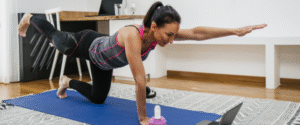How to Be More Confident in Any Situation

Confidence is a skill that anyone can develop. It helps in personal, social, and professional life. With the right mindset, you can feel more confident in any situation.
1. Maintain a Positive Mindset
Self-confidence starts with how you think. Positive thoughts help overcome fear and self-doubt. Focusing on strengths builds a strong foundation for confidence.
Avoid negative self-talk that lowers self-esteem. Replace doubts with empowering beliefs. Remind yourself of past achievements to boost confidence.
Practicing self-affirmations can help. Simple statements like “I am capable” reinforce confidence. The way you think shapes how you feel in any situation.
2. Improve Your Body Language
Nonverbal communication influences confidence. Standing tall and making eye contact shows self-assurance. Good posture helps you feel and appear more confident.
Smiling can also boost confidence. A friendly expression makes interactions smoother. Positive body language creates a strong first impression.
Avoid slouching or crossing your arms. Open gestures make you seem approachable. Small adjustments in posture have a big impact on confidence.
3. Prepare and Practice
Preparation reduces anxiety and builds confidence. Knowing what to expect makes situations less intimidating. Practicing skills enhances performance.
Before a presentation, rehearse key points. Practicing in front of a mirror improves delivery. The more prepared you are, the more confident you feel.
Visualization is also helpful. Imagine yourself succeeding in difficult situations. Mental preparation strengthens real-life confidence.
4. Dress for Success
The way you dress affects confidence. Wearing clothes that fit well boosts self-esteem. Dressing appropriately for occasions enhances your presence.
Choose outfits that make you feel comfortable. When you look good, you naturally feel better. Dressing well creates a sense of readiness.
Grooming also plays a role. A neat appearance reflects self-respect. Small changes in style can have a big impact on confidence.
5. Step Out of Your Comfort Zone
Growth happens outside of comfort zones. Trying new experiences builds resilience. Facing challenges increases self-belief.
Start with small risks to build confidence gradually. Speaking up in meetings or trying a new hobby strengthens self-trust. Every step forward boosts confidence.
Mistakes are part of growth. Learning from setbacks makes you stronger. Taking action despite fear leads to self-improvement.
6. Master Effective Communication
Confident people express themselves clearly. Speaking at a steady pace shows self-assurance. Practicing active listening enhances interactions.
Avoid using filler words like “um” or “uh.” Pausing before speaking improves clarity. A calm and controlled tone conveys confidence.
Engaging in conversations with new people strengthens communication skills. Asking thoughtful questions keeps discussions flowing. Confidence grows with practice.
7. Focus on Strengths Instead of Weaknesses
Recognizing your abilities boosts confidence. Everyone has unique talents and skills. Celebrating achievements builds self-worth.
Instead of comparing yourself to others, focus on personal progress. Tracking improvements reinforces confidence. Recognizing growth fosters a positive mindset.
Accepting imperfections is also important. Confidence doesn’t mean being perfect. It’s about believing in your ability to handle challenges.
8. Develop a Growth Mindset
Confidence grows through learning and improvement. Seeing challenges as opportunities builds resilience. A growth mindset encourages continuous progress.
Failures don’t define your abilities. Learning from mistakes strengthens confidence. Viewing setbacks as lessons leads to long-term success.
Surrounding yourself with positive influences helps. Supportive people encourage self-growth. Learning from mentors boosts confidence.
9. Take Care of Your Physical and Mental Health
Well-being affects confidence levels. A healthy body supports a strong mind. Regular exercise releases endorphins that enhance mood.
Eating nutritious food fuels energy and focus. A balanced diet supports mental clarity. Taking care of yourself promotes self-confidence.
Mental health is equally important. Practicing relaxation techniques reduces stress. A clear and calm mind handles situations with confidence.
10. Keep Practicing Confidence Daily
Confidence is a habit that develops over time. Small actions every day strengthen self-belief. Repetition builds long-lasting confidence.
Trying new experiences regularly improves adaptability. The more challenges you face, the more confident you become. Daily efforts lead to noticeable growth.
Self-confidence is a journey. Every step forward increases self-trust. Believing in yourself makes every situation more manageable.
Conclusion
Confidence comes from mindset, preparation, and action. Small changes lead to big improvements. By practicing these habits, you can feel more confident in any situation.













